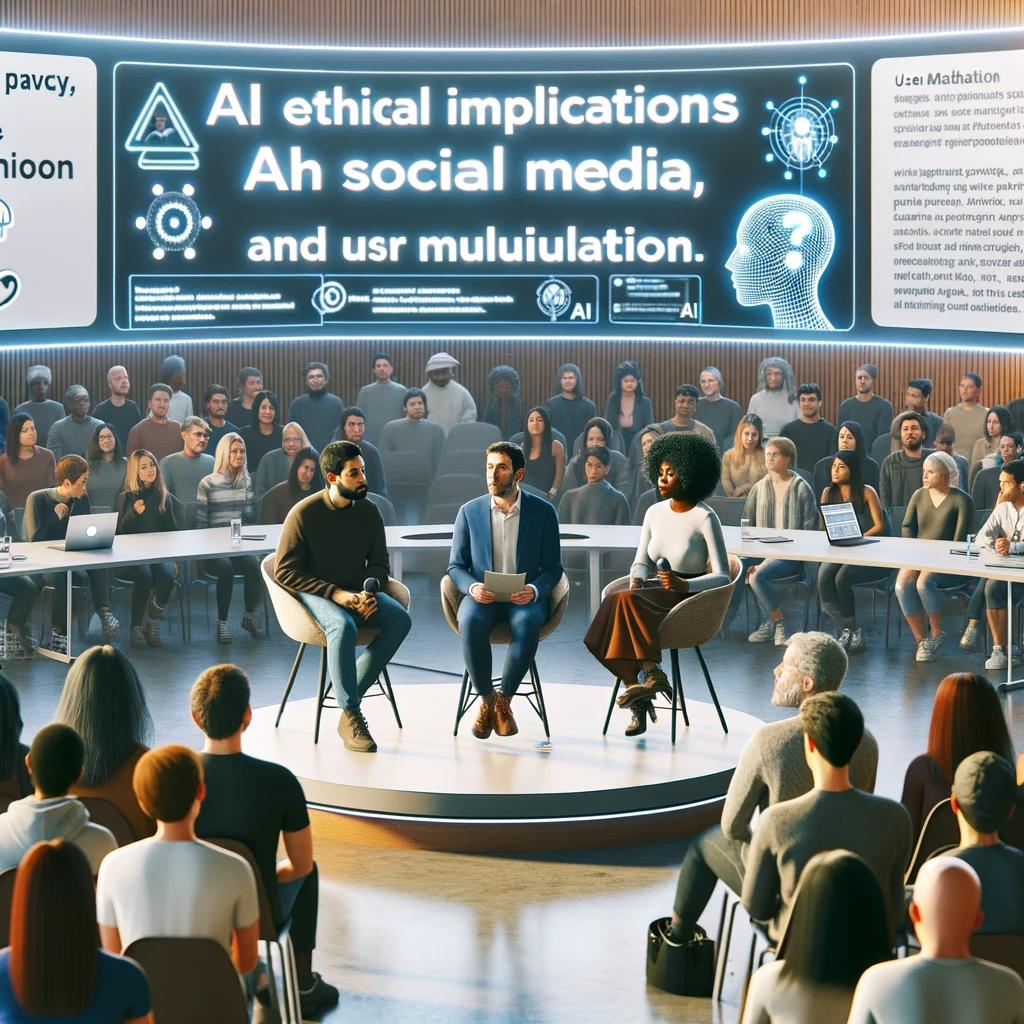In today’s rapidly evolving digital landscape, social media has become an integral part of our lives, fundamentally changing the way we communicate, share information, and shape public discourse. Platforms like Facebook, Twitter, Instagram, and TikTok have not only connected individuals across the globe but have also emerged as powerful tools for influencing public opinion, mobilizing movements, and disseminating information. However, as social media’s influence has grown, so too have the challenges associated with it, including the need for effective content moderation, ensuring meaningful user interactions, and combatting the spread of misinformation and harmful content.
In this context, Artificial Intelligence (AI) has emerged as a transformative force that promises to reshape the landscape of social media. AI, with its capacity for data analysis, pattern recognition, and automation, is poised to play a pivotal role in addressing these challenges and unlocking new possibilities for the future of social media.
The central question that we explore in this article is: How will AI impact content moderation, user interactions, and the spread of information on social media platforms? To answer this question comprehensively, we will delve into the multifaceted relationship between AI and social media, examining how AI technologies are currently being integrated into these platforms and the potential consequences for users, content creators, and the broader society.
To guide our exploration, we have structured this article into six distinct sections, each addressing a critical aspect of AI’s influence on social media. We will begin by discussing the current integration of AI in social media, followed by an examination of AI’s role in content moderation, user interactions, and information dissemination. We will also delve into the ethical considerations and challenges associated with AI in social media and speculate on the future outlook of this transformative relationship.
Through this comprehensive exploration, we aim to shed light on the ways in which AI is shaping the future of social media, its potential benefits, and the critical considerations that must be addressed to ensure a responsible and ethical integration of AI in this ever-evolving digital landscape.

The Integration of AI in Social Media
Social media platforms have become an integral part of our daily lives, facilitating communication, information sharing, and community building on a global scale. In recent years, the integration of Artificial Intelligence (AI) has significantly transformed the landscape of social media. AI, with its ability to analyze vast amounts of data and make real-time decisions, is playing a pivotal role in shaping the user experience and content dissemination on these platforms.
AI in social media is not a recent development but rather a progressive evolution. Initially, AI was primarily used for data analysis, helping platforms understand user behavior, preferences, and trends. It provided insights that allowed for targeted advertising and content recommendations, enhancing the overall user experience.
Today, AI in social media has expanded its capabilities. It employs natural language processing and machine learning algorithms to analyze user-generated content, enabling content personalization on a scale never seen before. AI algorithms can determine what posts users are likely to engage with, curating their newsfeeds accordingly. This level of personalization enhances user satisfaction and engagement, as users see content that aligns with their interests and values.
Furthermore, AI-driven chatbots and virtual assistants are becoming common features on social media platforms. These chatbots can provide instant responses to user queries, improving customer service and interaction efficiency. Additionally, AI helps in content moderation, identifying and removing inappropriate or harmful content, such as hate speech and spam, to maintain a safe online environment.
In the following sections, we will delve deeper into the various aspects of AI’s influence on social media, including content moderation, user interactions, and the spread of information.
AI and Content Moderation
Content moderation on social media platforms has become an increasingly complex and essential task due to the sheer volume of user-generated content. AI plays a crucial role in automating and enhancing this process. AI algorithms are employed to detect and filter inappropriate content, including hate speech, misinformation, and spam.
AI-driven content moderation involves the use of machine learning models that have been trained on vast datasets containing examples of various types of problematic content. These models can quickly analyze and flag content that violates platform guidelines, enabling timely removal or intervention. For instance, AI can identify hate speech by recognizing patterns in language that are offensive or discriminatory.
However, content moderation using AI is not without its challenges. One significant challenge is context understanding. AI algorithms may struggle to discern between genuinely harmful content and content that contains similar keywords or phrases but is used in a non-harmful context. This challenge is especially prevalent in languages with complex nuances and idioms.
Another challenge is the potential for false positives and false negatives. AI algorithms may mistakenly flag benign content as problematic, leading to censorship concerns. Conversely, they may miss harmful content due to evolving language and tactics used by malicious actors.
Furthermore, the use of AI in content moderation raises questions about freedom of expression and censorship. While AI is effective in filtering out harmful content, there is a risk of over-policing and suppressing legitimate speech. Striking the right balance between preventing harm and preserving free expression is an ongoing challenge.
AI in Enhancing User Interactions
AI is profoundly influencing user interactions on social media platforms, often with the goal of maximizing user engagement and content visibility. One of the prominent ways AI achieves this is through personalized newsfeeds and targeted advertising.
Personalized newsfeeds are curated by AI algorithms that analyze a user’s past behavior, interests, and interactions to predict what content they are most likely to engage with. This customization leads to a more tailored user experience, with users seeing posts that align with their preferences. While this enhances user satisfaction and engagement, it also raises concerns about the creation of echo chambers and filter bubbles.
Echo chambers refer to situations where users are primarily exposed to content and opinions that reinforce their existing beliefs. Filter bubbles occur when users are isolated from information that contradicts their viewpoints. AI’s role in personalization can unintentionally exacerbate these phenomena, limiting users’ exposure to diverse perspectives and contributing to polarization.
Additionally, recommendation algorithms powered by AI have a significant impact on user interactions. These algorithms determine which content is displayed prominently on a user’s feed, affecting what they see and engage with. AI-driven recommendations can amplify certain types of content, potentially influencing public opinion and discourse.
While AI has the potential to enhance user interactions and content discovery, it is essential to consider the ethical implications and consequences of personalized feeds. Striking a balance between personalization and exposure to diverse viewpoints is crucial for maintaining healthy online communities and fostering meaningful conversations.

AI and the Spread of Information
AI plays a significant role in influencing the spread of information on social media platforms, often shaping public opinion and discourse. AI algorithms are designed to prioritize and amplify certain types of content, which can have profound effects on what users see and engage with.
One of the key ways AI influences the spread of information is through content recommendation algorithms. These algorithms determine which posts, articles, or videos are displayed prominently in a user’s feed. AI achieves this by analyzing user behavior, engagement patterns, and personal preferences to predict what content is most likely to capture a user’s attention. While this personalization enhances user experience, it also means that users are exposed to content that aligns with their existing beliefs and interests, potentially creating echo chambers and filter bubbles.
Furthermore, AI can be used to combat the spread of misinformation and fake news. Natural language processing (NLP) algorithms are employed to detect and flag content that contains false or misleading information. Fact-checking mechanisms powered by AI are becoming more common, providing users with additional context and information to evaluate the credibility of content.
However, the ethical considerations surrounding AI’s influence on information dissemination are crucial. Social media platforms and AI developers bear significant responsibilities in ensuring that the content amplification mechanisms are used ethically and responsibly. There is a fine line between curating content for user engagement and inadvertently promoting harmful or misleading information.
Challenges and Ethical Considerations
The use of AI in social media platforms presents various ethical challenges and concerns that require careful consideration. These include:
- Privacy Issues: AI algorithms often rely on the analysis of user data to personalize content and recommendations. This raises privacy concerns, as users may be uncomfortable with the extent to which their data is used to influence their online experience.
- Algorithmic Biases: AI algorithms can inadvertently perpetuate biases present in the data they are trained on. This can result in discrimination or unfair treatment of certain user groups, as well as reinforcing existing stereotypes.
- Transparency and Accountability: There is a need for transparency in how AI algorithms operate and make content recommendations. Social media platforms must be accountable for the impact of their AI systems on user behavior and public discourse.
- Regulatory Frameworks: The ethical use of AI in social media platforms may require the development of regulations and guidelines to ensure responsible AI deployment and user protection.
Future Outlook and Conclusions
The future of AI in social media holds exciting possibilities and significant challenges. As AI technology continues to advance, it is likely to have a profound impact on user experience, content moderation, and information dissemination.
AI algorithms will become more sophisticated in understanding user behavior and preferences, further enhancing content personalization. However, striking a balance between personalization and exposure to diverse perspectives will remain a critical challenge.
In the context of content moderation, AI will play a crucial role in identifying and removing harmful content, but addressing the nuances of context and language will require ongoing refinement.
Conclusively, the responsible and ethical use of AI in social media is essential to ensure that these platforms remain safe, inclusive, and conducive to meaningful interactions. The balance between leveraging AI for platform improvements and addressing ethical, privacy, and societal concerns will be at the forefront of discussions in the evolving landscape of AI-driven social media.

Conclusion
The integration of Artificial Intelligence (AI) into social media platforms has ushered in a new era of user experience, content moderation, and information dissemination. AI’s ability to personalize content and enhance user interactions has transformed the way we engage with social media. However, this technological advancement is not without its ethical considerations.
The balance between leveraging AI for platform improvements and addressing ethical concerns is paramount. While AI has the potential to make social media more engaging and efficient, it also raises questions about privacy, algorithmic biases, and content censorship. Striking the right balance between personalization and exposure to diverse perspectives remains a challenge.
As we look to the future, it is crucial to consider how AI will continue to shape our digital interactions. How can we ensure that AI is used responsibly and ethically on social media platforms? What role should regulations and transparency play in governing AI’s influence on our online experiences? These questions will shape the evolving landscape of AI-driven social media and its broader impact on society.
